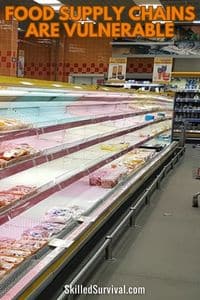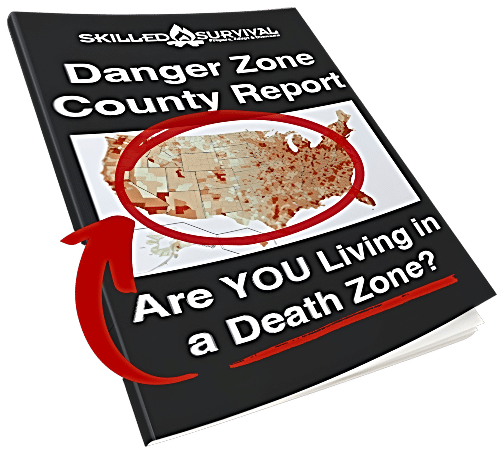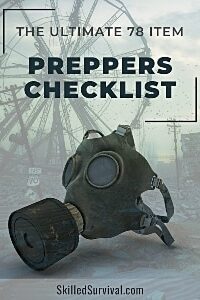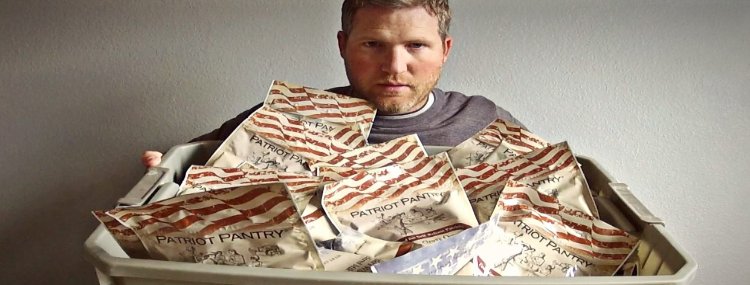
An Analysis Of How Fragile Our Food Chain REALLY Is
Because we’re all at the mercy of food supply chains!
- From farm to factory…
- From transportation to grocer…
If this complicated system were to become compromised, millions would suffer.
And it’s WAY more vulnerable than most people think….
- Introduction & My Food Industry Background
- Supply Chain Inventories (Durable vs. Food)
- Grocery Stores Can’t Increase Their Inventories
- Grocery Stores Are More Fragile Than We Think
- Events That Could Cause A Food Disruption
- Why You Should Start Living A Resilient Life

Want a free Danger Zone County Report?
Click here to download this report and see if you're in a Danger Zone County (or not). No purchase necessary.NOTE: Watch the video below OR skip past it to read the transcript:
↓ You’re At The Mercy Of The Food Supply Chain
Introduction & My Food Industry Background
You see, I grew up on a farm in Iowa.
So, I was a part of the very first step of today’s modern-day supply chain for 18 years.
Then after college, I worked for 10 years as an Engineer at a major food manufacturer.
So, for 28 years, I’ve seen how the distribution of food works.
First from farm to factory and then from the factory to the grocer.
And if this distribution system were to become compromised for an extended period, our society would suffer.
You’ll suffer. We’ll all suffer.
Why? Because we ALL need to consume lots of food regularly to survive.
And very few of us grow enough food on our own to survive long.
Sure, you might have a backyard garden.
But that will not last long if the food supply chain stops.
And even if you have a large food stockpile, most folks will burn through that in a few weeks or months.
So, let’s get into what makes food supply chains so susceptible to disruption.
Supply Chain Inventories (Durable Goods vs. Food)
First, let me ask a question:
What happens when you combine “limited inventories” with “bottlenecks issues” in a supply chain?
If those issues (inventories and bottlenecks) get a bit out of whack (but not disastrous), you end up with inflation and some shortages.
No matter the product, if demand outstrips the ability to supply, “goods” must go up in price.
IF you can even get the goods at all…
For example:
The demand for the latest video game console – the PS5 – is very high.
And due to a very limited supply of silicone – a necessary ingredient to build chips and processors for this tech, you end up either:
- Paying through the nose on secondary markets.
- Or you must hit up targets and Walmart’s daily to try to snag one before they are gone in minutes.
- Or you go without
But what if we’re not talking about a video game console and instead about something you can’t delay purchasing (at least for long)?
I’m talking about FOOD.
Humans can’t put off buying food for very long.
For example:
You can make it a month, perhaps 60 days, without stockpiles before you die.
But things will get desperate WAY before that.
I’m talking days – or even as little as 72 hours before widespread panic ensues.
So, a steady demand for food is necessary for modern society.
We ALL must go to the grocery store at some regular frequency.
It’s not an option.
You can’t NOT eat for 6 months.
You eat, or you die – it’s simple math.

Want a free 78 item prepper checklist?
Click here to instantly download this Complete Checklist PDF. No purchase necessary.Why Can’t Grocery Stores Increase Their Inventories?
One way to combat this reality (this built-in constant demand for food) is for grocery stores to stockpile more.
It’s called “slack.”
Larger grocery store inventories help absorb disruptions.
So why don’t grocery stores do this?
Well, this approach has two problems: expiration dates and margins.
1. Food Expiration Dates
First, food is not like phones or computers.
Food spoils.
That’s one reason why grocery stores can only hold so much “extra” food.
And the best, high-quality, fresh foods spoil the fastest.
If a food doesn’t spoil, it’s usually void of the best nutrients and stuffed with preservatives.
The one big exception to that rule is Freeze Dried Foods.
These meals can be fairly nutritious and have been shelf-stable for decades.
But grocery stores don’t tend to sell those.
Survival food vendors focus on those because freezing dry foods is expensive, and fresh food tastes better.
So, they tend to leave freeze-dried meals for folks in preparedness.
Not for the masses.
Sure, grocery stores sell rice and pasta.
These are dried grains you can buy and stockpile.
But those are just simple carbs – easy calories.
They lack essential vitamins and proteins your body needs over the long haul.
While freeze-dried meals tend to have those veggies and nutrients in their meals.
The bottom line is:
Because most food expires, grocery stores cannot keep large inventories “just in case.”
If they did, they’d risk much of it becoming waste during normal operations.
Spoilage is bad for business.
So grocery stores must keep their extra inventories as low as possible.
That’s why grocery stores require CONSTANT food deliveries.
Every day, trucks full of food come to the back of grocery stores to unload.
2. Margins
The other problem with a grocery store trying to increase its onsite inventories is it goes against capitalism’s “just-in-time” high efficiency, maximum profits business approach.
Carrying extra inventories is expensive – especially for large grocery store chains.
Even a little bit of extra cheese, milk, meat, or bread quickly becomes extra “working capital” that must be used to create these “extra” inventories.
Working capital is money that is necessary to run everyday business operations.
At large scales, this can cost multiple millions of dollars.
Dollars that cannot be used for other things like expansion projects, marketing, or paying out dividends.
So, any grocery store that carries any “extra” inventory – may have to raise its prices on the food to compensate for the inefficiencies.
But higher prices tend to be a big loser in the consumer’s mind.
Price Conscience shoppers will not pay much more at Store X if they can get it for a lot cheaper at Store Y.
If consumers go to another store, Store X’s “extra” inventories will move (or rotate) slower.
And as we discussed in the first point, quality food has a relatively short expiration date.
So having food sit in storage for a few extra days means more items that never get sold and become more waste (literal and financial waste).

Want a free 78 item prepper checklist?
Click here to instantly download this Complete Checklist PDF. No purchase necessary.Grocery Stores Are More Fragile Than You Think
So, the grocery store supply chain CAN’T stockpile extra food for surprise runs on their inventories.
IF demand spikes overnight, they cannot move fast enough to make up the difference.
For these two reasons, grocery stores are FRAGILE.
Yet, society acts as if they will always be fully stocked because, day in and day out over our lifetimes, that has been our collective experience.
But what IF the supply dried up for longer than a few days? What if grocery store shelves were limited for weeks?
Well, then grocery stores will get squeezed from both ends simultaneously, supply and demand.
Why? Because empty shelves create panic. So demand will spike BECAUSE of supply constraints.
Events That Could Cause A Massive Supply Side Food Disruption
Two main potential bottlenecks could crush the supply chain.
Production and delivery.
1. Production
If farms could not produce the same yields due to draughts or topsoil erosion, less food would be available – and prices would rise.
This would likely be a slow crisis.
Not many disasters could stop ALL food production at once – unless an asteroid hit or we saw a nuclear winter.
Possible? Yes. Likely? Who knows…?
But the other bottleneck is the delivery of these goods.
I’m talking about trucks and truckers.
How could the delivery system fail?
- How about a massive EMP that instantly fries the onboard computer systems of most trains and trucks?
- Or perhaps a supermassive volcanic explosion where ash would enter many trucks’ air intakes and ruin the engines?
- Or perhaps nuclear war would force many truckers to hunker down to avoid driving through areas contaminated with nuclear fallout?
And while each of those is possible, they seem to be on the long tail, rare event side of things.
2. Distribution
What if a mass of TRUCKERS go on strike?
If truckers were to strike IN MASS, they could bring our food supply to its knees.
Raw grains, meats, and cheeses can’t be transported from farm to factory or from farm to grocer.
Well, it wouldn’t take long for real food scarcity to hit.
And once food scarcity became a real narrative, folks would stock up FAST.
And boom, the grocery store shelves are empty and not getting refilled anytime soon.
Once that happens, society is only 72 hours from real pain and panic.
Perhaps even a “collapse.”
If you want to see true societal panic and chaos?
Starve a majority of citizens for a week or so…
That’ll get everyone’s attention.
Now, guess who recently decided to strike in Canada? Truckers.t.
Is it a harbinger of things to come?
Could poor relations between Governments and truckers cause more strikes, walkouts, and disruptions?
You bet.
This thought experiment should highlight how critical truckers are to a well-functioning modern survival.
Sure, you can say, “If they strike, someone else will just find a truck and drive it….”
We’re already low on quality truckers with the skills AND trucks to do the job.
So, if the industry were to protest and it was large enough and long enough?
Things could go south real FAST!
You Should Start Living A Resilient Life
Now, to wrap this up.
I like to focus on things YOU can do.
The actions you can take, activities you control.
That’s why you should stockpile lots of food and learn to live more resiliently.
Because most people live fragile lives, they have no idea how fragile our supply chain system is or how dangerous our world is becoming.
That’s because we’ve become extremely complacent over the years.
For example:
During normal times, occasionally, the thing you want may take longer than expected to arrive.
But for the most part, people ASSUME grocery store shelves will always be well stocked.
And physical goods are just a few clicks and 2-day shipping away.
But we all know how dangerous assumptions can be.
That’s a fragile way to live, and you’re putting your life in the hands of others (i.e., supply chains).
Instead, you should work towards improving your own resiliency.
Prepare for chaos, learn survival skills, and increase your own strategic stockpiles of food and supplies.
Action Plan
The best way I know how to continue to become more resilient and less fragile is to join my 30-day prepper challenge.
In this challenge, you complete 15 meaningful tasks that will make you more prepared than most neighbors – all in 30 days.
Each challenge has both a basic and advanced component, so no matter where you are on your preparedness journey, my 30-day challenge is right for you.
Why Trust Skilled Survival...
Go here now to review a full breakdown of:
- Who We Are
- Our Credentials
- Our Mission
- & Product Recommendations...
Here are a few highlights of our teams credentials & certifications:
- Certified Member of a Mountain Search & Rescue Organization
- Plant Emergency & Safety Leader for a Major Food Manufacturer
- Member of the 10TH Mountain Division Hut Association
- Certifications: Avalanche 1, WFR, CPR
- Official Gear Tester for Numerous Outdoor Gear Companies
- Countless Multiday Backpacking trips into Remote Wilderness
- Bachelor's Degree In Mechanical Engineering
- Bachelor's Degree In Civil Engineering
- Bachelor's Degree In Biomedical Engineering
"It takes 20 years to build a reputation and five minutes to ruin it." - Warren Buffett
We're fully aware that trust is NOT something you GET but is EARNED.
And we'll continue to earn YOUR trust through our forthright and honest approach with each new Blog Post, Guide & Product we create...
Prepare, Adapt & Overcome,

P.s. Do You Live In A 'Danger Zone' County?

Find out now using my Danger Zone County List & Special Report it’s absolutely FREE.
In minutes you’ll know EXACTLY where you stand and if you should be worried or not..
So click here to get my FREE Danger Zone County List & Report…

Recommended Reading
Best Canned Meats To Round Out Your Food Stockpile
Not all canned meats are created equal. Most are great for a quick meal but we review the best ones to add to your emergency pantry.
Best Powdered Milks With An Insanely Long Shelf Life
Not all powered milks are created equal. We've uncovered all the best deals and share tactics on how to significantly extend it's shelf life.
Best Grain Mills To Grind Your Own Grains At Home
Need help finding the best grain mill for you? We show you the key features to look for (and avoid) - plus the 9 best on the market today
Best Powdered Eggs (& Deals) On The Market Right Now
The best powdered eggs are tasty, affordable, long lasting and worth buying! In this guide, we review the best ones to make your search easy.
Best Canned Breads (& Mixes) With Insanely Long Shelf Lives
The best canned breads are tasty, affordable, long lasting and worth buying! In this guide, we review the best ones on the market to make your search easy.
Best Powdered Peanut Butters With Insanely Long Shelf Life
Best Peanut Butter Powders for long term protein storage - 1. Ready Hour 2. Augason Farms 3. Legacy Foods 4. PBfit 5. Naked PB 6. PB2 Pure...




